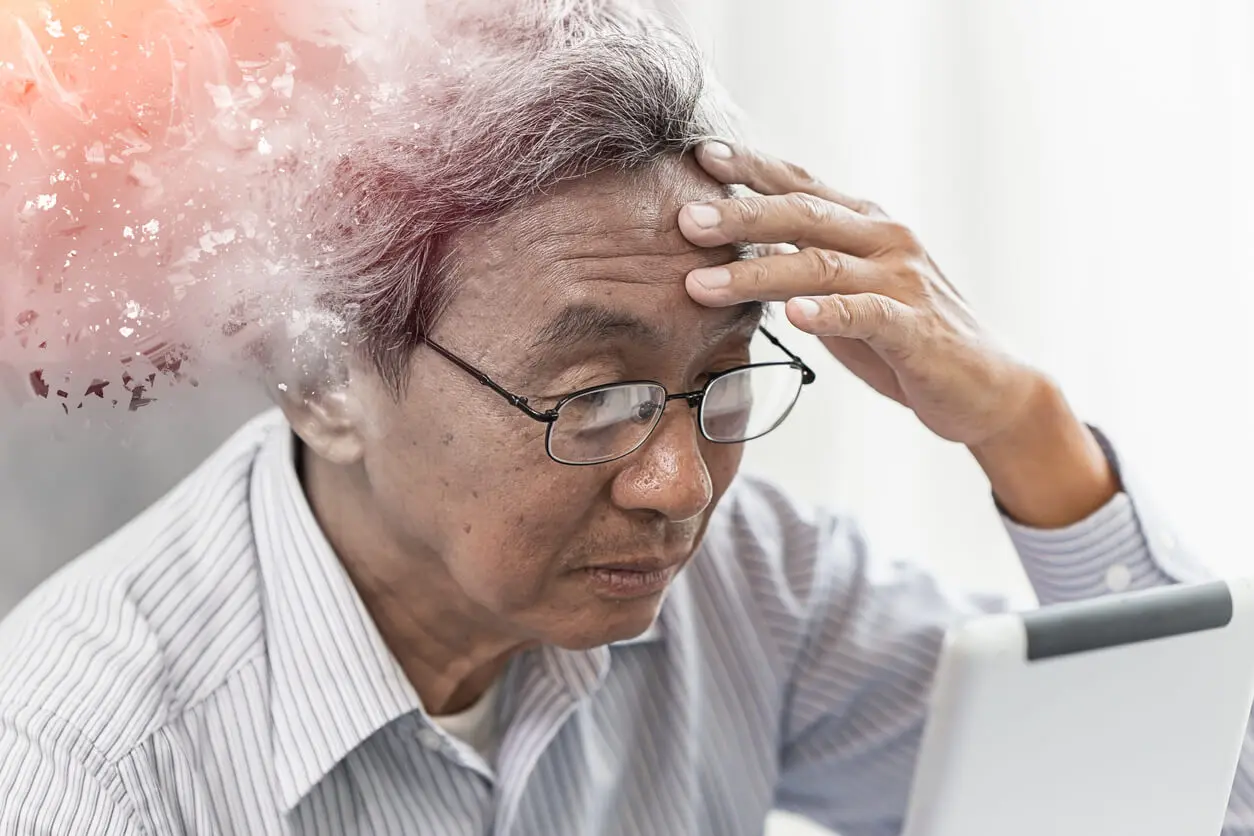Depressive Pseudodementia: Everything You Need to Know


Written and verified by the psychologist Maria Fatima Seppi Vinuales
“It’s just that he forgets things, you ask him something and it’s like he’s in his own world.” Many consultations for suspected cases of dementia begin with phrases that reveal everyday situations like these. However, there may be depression behind it all, and this is when depressive pseudodementia can appear.
Dementias can function as a catch-all for concerns about cognitive performance. However, if we delve a little deeper, we’ll find mood disturbances.
What is dementia and depression?
To understand what depressive pseudodementia is about, it’s useful to start by asking what dementia is and what depression is. Dementia is a term used to identify degenerative diseases that usually have multiple causes and involve a progressive deterioration, especially in certain brain functions. Perhaps the best-known example is Alzheimer’s disease.
Depression refers to a mood disorder, which also has subtypes and is expressed through multiple symptoms. Among the best known are the following:
- Listlessness
- Apathy
- Fatigue
- Changes in sleep and appetite
- Loss of interest in activities that were pleasurable

Let’s talk about depressive pseudodementia
We use the term depressive pseudodementia because, even though it isn’t dementia, it is often confused with it. This is so because cognitive alterations are present. However, in most cases, there’s a previous psychiatric disorder, which coincides with depression.
It’s important to identify the symptomatology to arrive at accurate diagnoses.
In general, depressive pseudodementia begins with an alteration of mood, with the beginnings of anguish, sadness, and malaise. Then more cognitive signs may appear, such as memory loss, inattention, difficulties in concentrating and starting and finishing tasks, as well as impaired judgment.
In a third stage, there’s a need to want to be alone, to do nothing (isolation and inactivity), which makes interactions difficult. This leads to a progressive impairment of social skills.
We can also mention that the alteration of mood influences the way in which patients behave when solving some neurological tests. For example, those with depression retain their apathy and listlessness and generally reply with “I don’t know”.
Depressive pseudodementia may be reversible.
The main differences with neurodegenerative dementias
Many professionals consider depressive pseudodementia to be a challenge, as overlapping signs and symptoms of dementia can initially complicate diagnosis. However, those who know more about the subject suggest that there are certain elements that can clarify this diagnosis:
The temporality
Regarding temporality, it’s important to take into account the age of the patients. For example, those who manifest these signs and are 65 years of age or older are often immediately told that they have dementia. However, it’s necessary to reconstruct their history and case.
A pseudodementia has a subacute onset and a more rapid evolution. In this sense, it affects daily and functional functioning more obviously, especially the mood component, compared to the cognitive component.
Neurodegenerative dementias have a slower and more progressive development.
Memory
In depressive pseudodementia, immediate and remote memory are affected simultaneously. While, in the case of dementia, the deterioration begins with immediate memory.
Social skills and relationships with the environment
In general, depression has an almost immediate impact on social relationships from its onset, as the person tends to isolate themselves, is reserved, and has little interest in interaction. In dementia, this isn’t necessarily the case. Someone may have difficulty sharing a recent memory, but still want to meet with friends.

You may be interested in: The Differences between Dementia and Alzheimers
Some keys to act against depressive pseudodementia
Some initial recommendations to keep in mind are the following:
- Try to do some activities during the day. No matter how difficult it may be and how little you feel like doing it, you have to overcome this resistance to activity. Start with simple, short-term activities, such as going for a 10-minute walk each day, doing laundry, establishing hygiene habits, and reading.
- Try to maintain a routine for getting up and going to bed. Even if you just feel like staying in bed all day, you need to try to continue with certain activities. If you find it too difficult, try setting several alarms or commit to some responsibilities that force you to get up.
- Avoid using substances, such as illicit drugs or alcohol.
- Ask for professional help. Depression and its variants, such as depressive pseudodementia, require a comprehensive approach, beyond just medication. There are different types of psychological therapies that can help with the process.
It’s important for you to know that, when carrying out these activities, you aren’t going to feel good right away, nor are you necessarily going to do them as happily as you did in the past. Don’t expect that, because it can be frustrating.
Keep in mind that small steps help you to get out of the place where you are today and walk towards where you want to be tomorrow.
You may be interested in: What to Do and Say if Your Partner Has Depression
Understanding health as a whole
Beyond the fact that there are many factors involved, one of the central points that sustains the confusion in the diagnosis has to do with the data provided to the professional. It’s common for family members to worry about cognitive symptoms and place special emphasis on them, neglecting the emotional.
Quality of life and well-being are a whole. While we may worry that someone can’t start and finish a task, in the case of depressive pseudodementia, the problems started earlier, with other signs (loss of interest, pessimistic outlook, discouragement).
In this sense, let us not underestimate the role of emotions. Mood is an essential component in being able to have a better life.
All cited sources were thoroughly reviewed by our team to ensure their quality, reliability, currency, and validity. The bibliography of this article was considered reliable and of academic or scientific accuracy.
- Rodríguez Palancas, A., García de la Rocha, M., Losantos, R. J., Moreno, J. M., Sierra, I., Fernández Armayor, V., & Martín, A. (2002). Pseudodemencia depresiva:¿ depresión o demencia?. Psiquis (Madr.), 23(4), 155-163.
- Carrasco Perera, J. L., Rodríguez Sánchez, J. M., & Legascue de Larrañaga, I. (2004). Diagnóstico diferencial entre seudodemencia depresiva, demencia frontal y demencia subcortical: estudio de un caso. Actas esp. psiquiatr, 60-64.
This text is provided for informational purposes only and does not replace consultation with a professional. If in doubt, consult your specialist.








